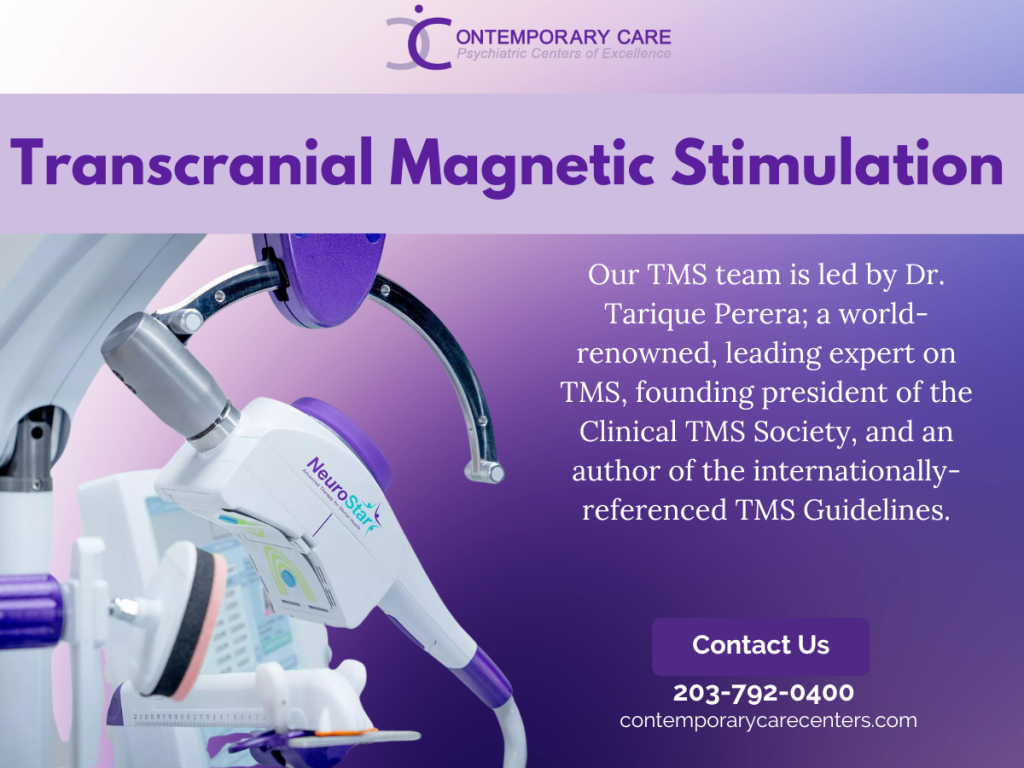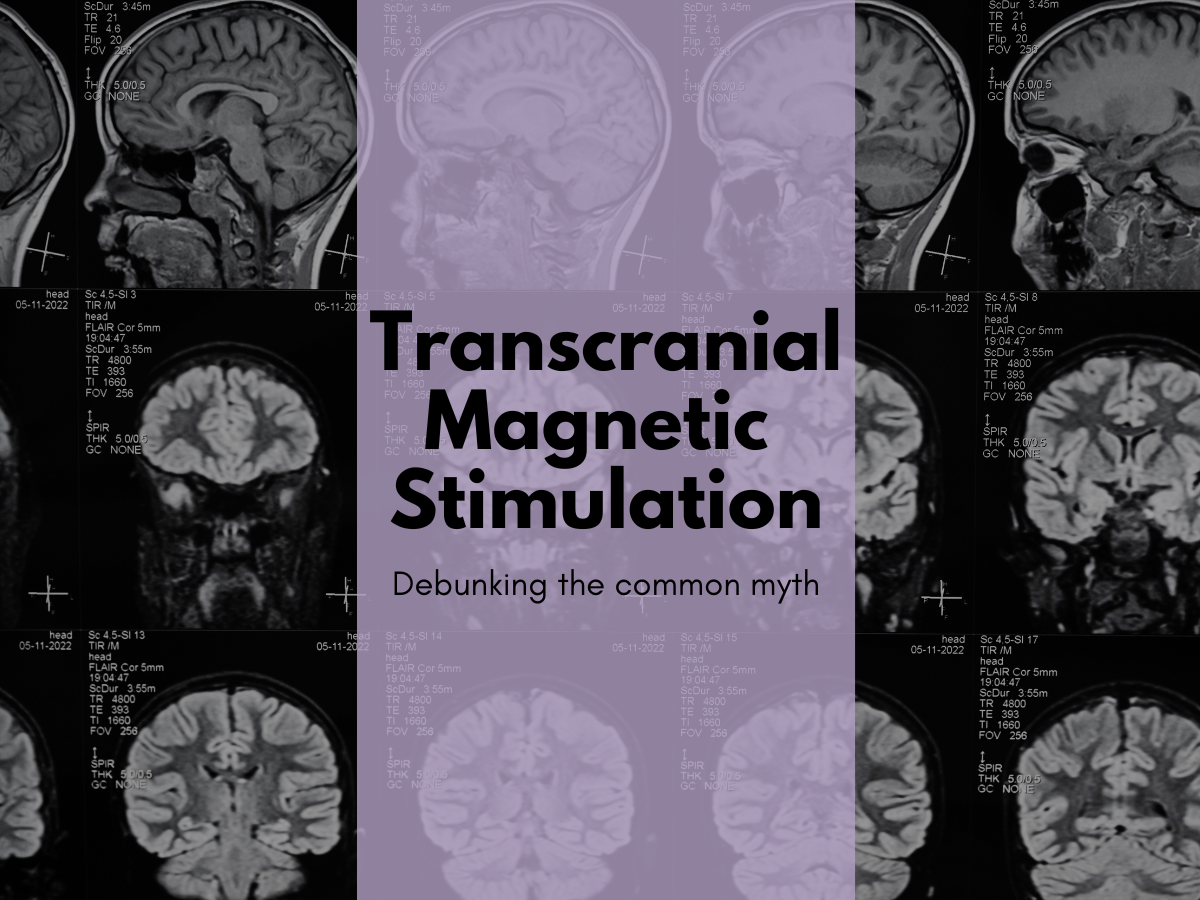TMS therapy provides hope for individuals facing depression and other mental health challenges. Although it’s proven safe and effective, misunderstandings often obscure its reputation.
In this blog post, we aim to understand TMS therapy for anxiety, debunk the common misconceptions about this therapy, and showcase how it can positively impact lives.
What is TMS Therapy?
TMS is a non-invasive treatment using magnetic fields to stimulate brain nerve cells, particularly those regulating mood. It targets depression and other mental health disorders with remarkable precision.
The Truth About TMS Therapy for Anxiety
TMS therapy for Anxiety directly addresses the neurological roots of mental health issues, unlike traditional medications that affect the entire body. Its focused approach minimizes side effects and offers hope to individuals who haven’t responded to prior antidepressant medication.
TMS: A Safe and FDA-Approved Option
FDA-approved for depression treatment, accelerated TMS is also being explored for anxiety, PTSD, and OCD. It presents a non-invasive alternative to conventional treatments like medication and electroconvulsive therapy (ECT).
So, TMS therapy for anxiety offers a beacon of hope for individuals struggling with depression and other mental health issues.
By debunking common myths and misconceptions, we aim to promote awareness and encourage individuals to explore this transformative treatment option.
Myth 1: TMS Therapy is Painful
Transcranial Magnetic Stimulation (TMS) therapy is a non-invasive FDA-cleared treatment of major depression and other mental health conditions. During the procedure, a small coil is placed against the scalp, delivering magnetic pulses to stimulate nerve cells in the brain. These pulses are painless and generally well-tolerated by patients.
Patient Experiences and Pain Levels
Many patients report feeling only a slight tapping or tingling sensation on the scalp during the TMS session. The discomfort, if any, is usually minimal and temporary. Patients often find the treatment site relaxing and may even listen to music or watch TV during their sessions.
Despite misconceptions, TMS therapy is not typically associated with significant pain or discomfort. Any discomfort experienced is typically mild and short-lived.
Patients should communicate with their healthcare provider about any discomfort they may experience during treatment, as adjustments can be made to improve comfort levels.
Myth 2: TMS Therapy is Unsafe
In transcranial magnetic stimulation (TMS) therapy, safety is paramount. Strict protocols and regulations are in place to ensure the safety of patients undergoing this treatment.
These protocols outline the necessary precautions and procedures that practitioners must follow to minimize potential risks or adverse effects.
Review of Research Supporting Safety
Extensive research and clinical studies have been conducted to evaluate the safety of TMS therapy. Research shows that Transcranial Magnetic Stimulation (TMS) is safe and effective for treating depression, migraines, and OCD. TMS involves placing a coil on the scalp to send magnetic pulses to different brain areas.
Approved for depression in 2008, newer coils and stimulation methods like theta-burst stimulation and accelerated treatment are enhancing its effectiveness. Overall, research emphasizes TMS’s safety when administered by trained professionals.
The findings from these studies provide valuable evidence supporting the safety of TMS as a therapeutic intervention for various mental health conditions, including depression and anxiety.
Addressing Concerns about Potential Risks
While TMS therapy for anxiety is generally considered safe, concerns about potential risks may still arise. Some individuals may worry about the possibility of adverse effects such as headaches, scalp discomfort, or seizures.
However, it’s essential to understand that these risks are minimal and rarely occur, especially when TMS is performed by qualified practitioners using approved protocols and equipment.
Additionally, healthcare providers closely monitor patients throughout the treatment process to promptly address any concerns, to ensure the safety and well-being of the patients.
Myth 3: TMS Therapy is Ineffective
Studies consistently demonstrate the effectiveness of TMS therapy in treating depression and other mental health conditions. Clinical trials have shown significant improvements in symptoms among patients receiving TMS compared to those who use traditional treatments alone.
Factors Influencing Treatment Effectiveness
Various factors can influence the effectiveness of traditional TMS and therapy, including:
- Treatment Frequency and Duration: The number and length of sessions matter.
- The intensity of Magnetic Stimulation: Stronger isn’t always better; it’s about finding the right balance.
- Individual Brain Chemistry: Everyone’s brain is different, affecting how they respond.
- Co-Occurring Mental Health Conditions: Other conditions can influence TMS effectiveness.
- Adherence to Treatment Protocols: Patients should understand that following the plan is key to success.
Myth 4: TMS Therapy is Only for Severe Depression
TMS: A Versatile Treatment Option
A common misunderstanding is that TMS is solely effective for severe depression. However, it’s important to recognize its potential in treating anxiety disorders, too. TMS therapy for anxiety works by adjusting brain activity, making it useful for various mental health issues.
Numerous studies have shown that TMS can significantly reduce symptoms in anxiety disorders like Generalized Anxiety Disorder (GAD) and Social Anxiety Disorder (SAD). By precisely targeting specific brain regions, TMS therapy offers promise for alleviating anxiety-related concerns.
Effectiveness Across Severity Levels
TMS shows promise for mild to moderate and severe cases, offering relief across the spectrum. Research suggests its efficacy even in treatment-resistant cases.
Beyond Depression: TMS Applications
TMS is beneficial for anxiety, OCD, PTSD, and the major depressive disorder. It’s also explored in a clinical TMS society for conditions like migraines, chronic pain, and neurological disorders.
Myth 5: TMS Therapy is Expensive
A common misconception is that TMS therapy for anxiety comes with a high price. However, understanding the cost factors associated with TMS can provide clarity.
Cost Considerations for TMS Treatment
While TMS therapy may seem costly upfront, it’s essential to consider its long-term benefits and potential savings in healthcare expenses. Factors influencing the cost include the number of sessions required and the geographic location of the treatment center.
Insurance Coverage and Affordability Options
A TMS clinic covers many insurance plans for TMS therapy, especially for the treatment of depression. Patients are encouraged to check with their insurance providers to determine coverage eligibility. Additionally, clinics often offer payment plans and financial assistance programs to make the TMS system more accessible to those in need.
Comparison of TMS Costs with Other Treatment Modalities
When comparing the cost of TMS with traditional treatment options like medication and therapy, the overall expense may be similar or even lower in the long run. Considering the effectiveness and potential for lasting results, TMS therapy proves to be a valuable investment in mental health care.
Myth 6: TMS Therapy Requires Hospitalization
One misconception surrounding TMS therapy for anxiety is the belief that it necessitates hospitalization. However, the best TMS therapy and treatment are primarily conducted on an outpatient basis, offering convenience and accessibility to patients.
Outpatient TMS Treatment
Unlike traditional hospital-based procedures, TMS therapy sessions happen in specialized clinics or treatment centers. Patients can schedule appointments at their convenience without the need for prolonged hospital stays.
Convenience and Accessibility of Outpatient Sessions
Outpatient TMS sessions allow individuals to maintain their daily routines and responsibilities while undergoing treatment. This flexibility enables patients to integrate therapy seamlessly into their lives, reducing disruptions and improving treatment adherence.
Addressing Misconceptions
Contrary to popular belief, TMS therapy for anxiety does not require hospitalization or inpatient care. Patients receive treatment in comfortable outpatient settings, ensuring a positive and stress-free experience throughout their sessions.
Myth 7: TMS Therapy Results in Memory Loss
There’s a misconception that TMS therapy leads to memory loss. However, extensive research shows minimal cognitive effects of TMS treatments.
Research on Cognitive Effects of TMS
Numerous research studies have explored the cognitive impact of repetitive TMS alone, particularly on memory function. These studies consistently demonstrate the safety of TMS regarding memory loss.
Some studies have suggested potential cognitive improvements through TMS application in areas other than the DLPFC, such as the left primary motor cortex. This is particularly observed for associative memory enhancement.
This research indicates that stimulating the left DLPFC with rTMS offers the most significant cognitive benefits.
Memory-Related Side Effects and Their Rarity
While some individuals may experience minor side effects during TMS treatment, such as headaches or scalp discomfort, significant memory loss is rare. The occurrence of memory-related issues is extremely uncommon and typically temporary.
Overall, TMS therapy is considered safe and well-tolerated, with minimal risk of adverse cognitive effects such as memory loss. Patients can undergo treatment confidently, knowing that memory-related concerns are occurring unlikely.
Myth 8: TMS Therapy is Invasive
Despite misconceptions, TMS therapy is non-invasive, which means it doesn’t require surgery or incisions in the patient’s head. TMS involves placing a coil gently against the scalp, through which magnetic pulses are delivered to targeted brain areas. This process is painless and doesn’t involve any surgical intervention.
Comparison with Invasive Treatments and Procedures
Unlike invasive treatments such as surgery, where incisions are made into the body, TMS is performed externally, without penetrating the skin or causing damage to underlying tissues. This makes it a safer and less traumatic option for patients.
However, it’s important to understand that TMS machines are non-invasive, offering significant benefits without the risks associated with invasive treatments.
Myth 9: TMS Therapy Is Experimental
Despite misconceptions, TMS therapy for anxiety is not experimental, but an established treatment modality recognized by the FDA.
TMS devices used in therapy are FDA-approved, ensuring their safety and effectiveness. The FDA regulates these devices to maintain quality standards and protect patients.
TMS as an Established Treatment Modality
TMS has been extensively studied and proven effective in treating various mental health conditions, including depression and anxiety. Numerous clinical trials and research studies have been done to prove its efficacy.
This noninvasive brain stimulation method, introduced by Barker and colleagues in 1985, can influence specific brain areas’ activity. It was originally designed to assist neurosurgeons with brain mapping before surgery.
This technique has demonstrated its ability to evoke motor responses and has since been extensively researched for understanding neuropsychiatric disorders and exploring its treatment potential.
While some may view TMS as experimental, it has gained widespread acceptance as a safe and reliable treatment option in the medical community. Its FDA approval and established track record attest to its legitimacy as a therapeutic intervention.
Considering TMS Therapy for Anxiety: Consult with Healthcare Professionals
They can provide personalized guidance.
Healthcare professionals offer tailored advice and recommendations based on individual needs and circumstances. Their expertise ensures that your treatment plan aligns with your specific requirements and maximizes the effectiveness of TMS therapy.
Assess whether TMS therapy for anxiety is suitable for you.
Consult with a healthcare professional to discuss your medical history and current condition. They can evaluate if TMS is a viable treatment option for you.
Address any concerns or questions you may have.
Feel free to raise any concerns or questions you may have. Your healthcare professionals are here to provide clarity and support throughout your TMS therapy journey. Don’t hesitate to reach out for assistance.
Ensure you receive accurate information.
You need to verify the information you receive about TMS Therapy for Anxiety. Consult reliable sources and trusted healthcare professionals for accurate guidance.
Guide you through the treatment process and provide ongoing support.
The TMS provider will guide you through the treatment, ensuring you understand each step. They will also provide ongoing support to address any concerns or questions that may arise during your TMS therapy journey.
Explore the Transformative Potential of TMS Therapy with Contemporary Care Centers in Connecticut

Discover personalized care and innovative solutions with Clinical Director, Tarique Perera MD, and our dedicated team of professionals at Contemporary Care Centers. Don’t let myths hold you back from discovering a brighter tomorrow – reach out now and start your journey towards a happier, healthier life with our TMS therapy clinic.



